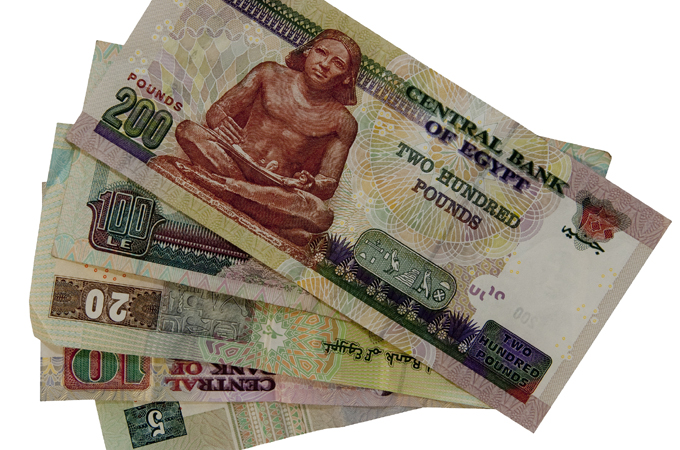
Egypt wins $8bn deal; pound plunges after currency move
CAIRO, March 7, 2024
The International Monetary Fund agreed to provide Egypt an expanded support of $8 billion on Wednesday, after the central bank unshackled its currency and delivered a 600 basis points rate hike in a push to stabilise the economy.
Additionally, Egypt would obtain a $1.2 billion loan for environmental sustainability, bringing its total from the IMF to more than $9 billion, the government said. This was towards the lower end of what some analysts expected, said a Reuters report.
The currency weakened to beyond 50 Egyptian pounds to the dollar - far beyond previous records - from about 30.85 pounds, a level Egypt has for months tried to defend. It closed at 49.4 to the dollar.
A more flexible exchange rate is seen as crucial for restoring investor confidence and is a key demand of the IMF, which had been in talks to expand the Fund's current, $3 billion support programme for the Arab world's most populous nation.
Egypt has in the past said it would shift to a more flexible exchange rate, only to return to closely managing the currency whenever the pound weakened. This time, after struggling with a prolonged economic crisis linked to chronic foreign currency shortages, it may be betting that hard currency inflows including a $35 billion investment deal signed in late February with the United Arab Emirates, will prevent a freefall, said the Reuters report.
The IMF, meanwhile, said: “We are pleased to announce that the Egyptian authorities and the IMF team have reached staff level agreement on the economic policies needed to complete the first and second reviews of the EFF arrangement. Amid significant macroeconomic challenges that have become more complex to manage with the impact of the recent conflict in Gaza on tourism and Suez Canal receipts, staff also considered the authorities’ request for an augmentation of IMF support to Egypt from SDR 2.35 billion (equivalent to about $3 billion) to SDR 6.11 (equivalent to about $8 billion). This agreement is subject to approval by the IMF Executive Board. The comprehensive policy package seeks to preserve debt sustainability, restore price stability, and reinstate a well-functioning exchange rate system, while continuing to push forward deep structural reforms to promote private sector-led growth and job creation.
The authorities are showing strong commitment to act promptly on all critical aspects of their economic reform program supported by the IMF. Policy discussions and program reforms revolved around six pillars, it said.
“First, the authorities have taken decisive steps to move toward a credible flexible exchange rate regime. This reform, which has started with the unification of the exchange rate between the official and parallel markets will (i) help increase the availability of foreign exchange and eliminate the current backlog of unmet foreign exchange demand, and (ii) re-establish a well-functioning interbank market for foreign exchange. There was agreement that a flexible exchange rate regime would help Egypt manage external shocks and would support the authorities’ decision to move toward a full-fledge inflation targeting regime over time.
“Second, additional monetary policy tightening to reduce inflation, and reverse the recent dollarization trend. In this regard, we welcome the recent decision by the Central Bank of Egypt to increase the policy rate by 600 basis points, in addition to the 200 basis points undertaken last month.
“Third, fiscal consolidation to preserve debt sustainability. The authorities agreed to maintain fiscal prudence over the medium-term and step-up efforts to mobilise additional domestic revenues, including through the rationalization of tax exemptions as well as to use a substantial part of divestiture proceeds to reduce debt.
“Fourth, a new framework to slow down infrastructure spending including projects that have so far operated outside regular budget oversight. In particular, the authorities noted that they would limit the total amount of public investment from all sources (i.e., budget, State Owned Enterprises, economic authorities, and other entities), and the Prime Minister has issued a decree that sets up a monitoring mechanism under his supervision, with participation from all relevant authorities present, and to be headed by Central Audit Agency.
“Fifth, the authorities also agreed on the need to provide adequate levels of social spending to protect vulnerable groups. In this regard, in addition to the expansion of the Takaful and Karama cash transfer program in 2023, they recently announced an additional EGP 180 billion social protection package for FY2024/25. The authorities also indicated that they would continue to provide support to ensure adequate living conditions for low and middle-income households that have been hit particularly hard by rising prices.
“Finally, the implementation of the State Ownership Policy and reforms to level the playing field will be key to unleash private sector growth. In this context, recent reforms eliminating preferential tax treatment and exemptions for state-owned enterprises are a step in the right direction. The accelerated pace of FDIs and divestiture programs since mid-2023 is a positive development that should contribute to improved confidence by markets and investors.
Egypt’s international and regional partners will play a critical role in facilitating the implementation of the authorities’ policies and reforms. In this context, the recent investment deal in Ras ElHekma alleviates the near-term financing pressures, it said.








